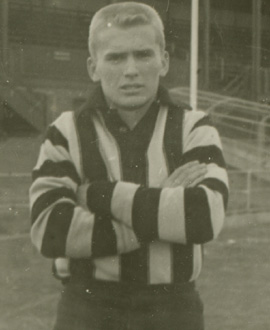

Ken Bennett is one of the few players who can claim to have played both reserves and senior matches in the same day.
His unusual feat came in the second round of the 1959 season, when Collingwood and Melbourne faced off for the first time since the monumental upset of the 1958 Grand Final.
Kenny was chosen to play in the seconds that day, and played the first half with the reserves. But then word filtered through that Ray Gabelich had decided to withdraw from the seniors game late because of a thigh injury. High-leaping big man Alan Wickes was brought in off the reserves bench, and Kenny was dragged from the reserves rooms at half-time and told he would replace Wickes as 20th man for the senior side.
Luckily he didn’t have to endure too many senior minutes that day, only coming on in the last quarter. But the fact that he so willingly saddled up for two games in one day says much about the kind of footballer – and person – that Ken Bennett was.
Ken came to Collingwood in 1957 as a fresh-faced 17-year-old with a big reputation as a junior footballer. He was still at Dandenong High School and had won the Federal League’s third 18 best-and-fairest award while playing for Dandenong in 1956.
His early practice match appearances were delayed while he recovered from a thigh injury, but by midway through the season, and after just three reserves games, selectors decided he was ready for the big league and chose him to make his debut against Hawthorn at Glenferrie Oval.
He started on the bench that day, but the next week against Essendon was named as first rover, with fellow schoolboy Keith Burns named as forward pocket and second rover. They were described in newspapers as ‘Babes in the Woods’.
Despite standing just 166cm tall, Ken wouldn’t have been fazed by making his debut at such a young age, because he was a gutsy, tenacious footballer. He also had a good eye for goal, and found the big sticks in five of his first eight games. As The Sun newspaper wrote: “He’s a sturdy little second string rover who never stops trying. Only needs to be a fraction faster off the mark to step into top class. You’ll easily spot his crew cut blond head as he moves around the fringe of the packs.”
He kept his place for the first eight games of 1958 before being dropped, but found his way back into the team late in the season (coincidentally, at the expense of Burns), and for the finals. And thank goodness he did, because he was a star that September. His game in the Grand Final, where he kicked two goals and was named among the best players, was arguably the finest he played in the VFL. He kicked those goals in a two-minute burst just before half-time, giving us a lead we would not relinquish.
“Two clever goals in as many minutes by Bennett, who battled his way courageously through the Melbourne defence, were the spark that set the Magpies aflame,” wrote The Age.
Despite his Grand Final heroics, Ken could never quite cement a place in the starting 18 after that. He missed the second half of the ’59 season with a knee injury, and at other times simply found himself out of favour, his relative lack of pace sometimes overriding his undoubted courage and determination.
He stayed at the club until 1962, but never played more than 12 games in a season. He then moved to Albury as captain-coach in 1963, and won the competition best-and-fairest in the Ovens & Murray League. He briefly turned his skills to TV commentary, working with Channel 0 and their VFA coverage.
But bigger things lay ahead for Ken. He got into politics and went to Canberra in the 1970s. He worked as an adviser for various Labor Ministers and MPs and would go to be the ALP’s assistant national secretary.
He moved to Darwin in 2005 to be closer to family, in the wake of his wife Elaine’s cancer diagnosis, and looked after her in her final years. A man with a strong sense of social justice, he subsequently became involved in local government work with remote Indigenous communities, delivering housing and infrastructure improvements, together with general health and wellbeing initiatives. He never lost his links to Collingwood, and at one stage bought the Wadeye football team black and white guernseys.
Ken was seriously injured in a car accident while driving to Weipa in 2009. His injuries were life-threatening – they included head injuries, a stroke and various broken bones – and doctors did not expect him to survive. But he defied the odds and made a remarkable recovery, though he struggled heroically with the after-effects for the rest of his life. During his rehabilitation, one of his inspirations was to regain enough strength in his legs to climb the 11 stairs at a friend's house to watch the 2010 Grand Final.
He lived out his days in Darwin, where he remained a larger-than-life character and much-loved member of his local community, a gregarious and funny man with a great spirit who could spin a great yarn.
Ken Bennett always stood out in the footage and photos from the 1958 Grand Final, his tiny frame and blond crewcut making him highly noticeable. It was the high point of his football career. But he would find other ways to stand out through the rest of his life, and his contributions to the community and social justice were no small thing. He was a man who delivered both on and off the field.
– Michael Roberts
CFC Career Stats
| Season played | Games | Goals | Finals | Win % |
|---|---|---|---|---|
| 1957-1962 | 56 | 37 | 3 | 58.9% |
CFC Season by Season Stats
| Season | GP | GL | B | K | H | T | D | Guernsey No. | ||
|---|---|---|---|---|---|---|---|---|---|---|
Other CFC Games
| Team | League | Years Played | Games | Goals |
|---|---|---|---|---|
| Collingwood | Night/Pre-season | 1961 | 1 | 1 |
| Collingwood | Reserves | 1957 - 1962 | 40 | 34 |
Awards








